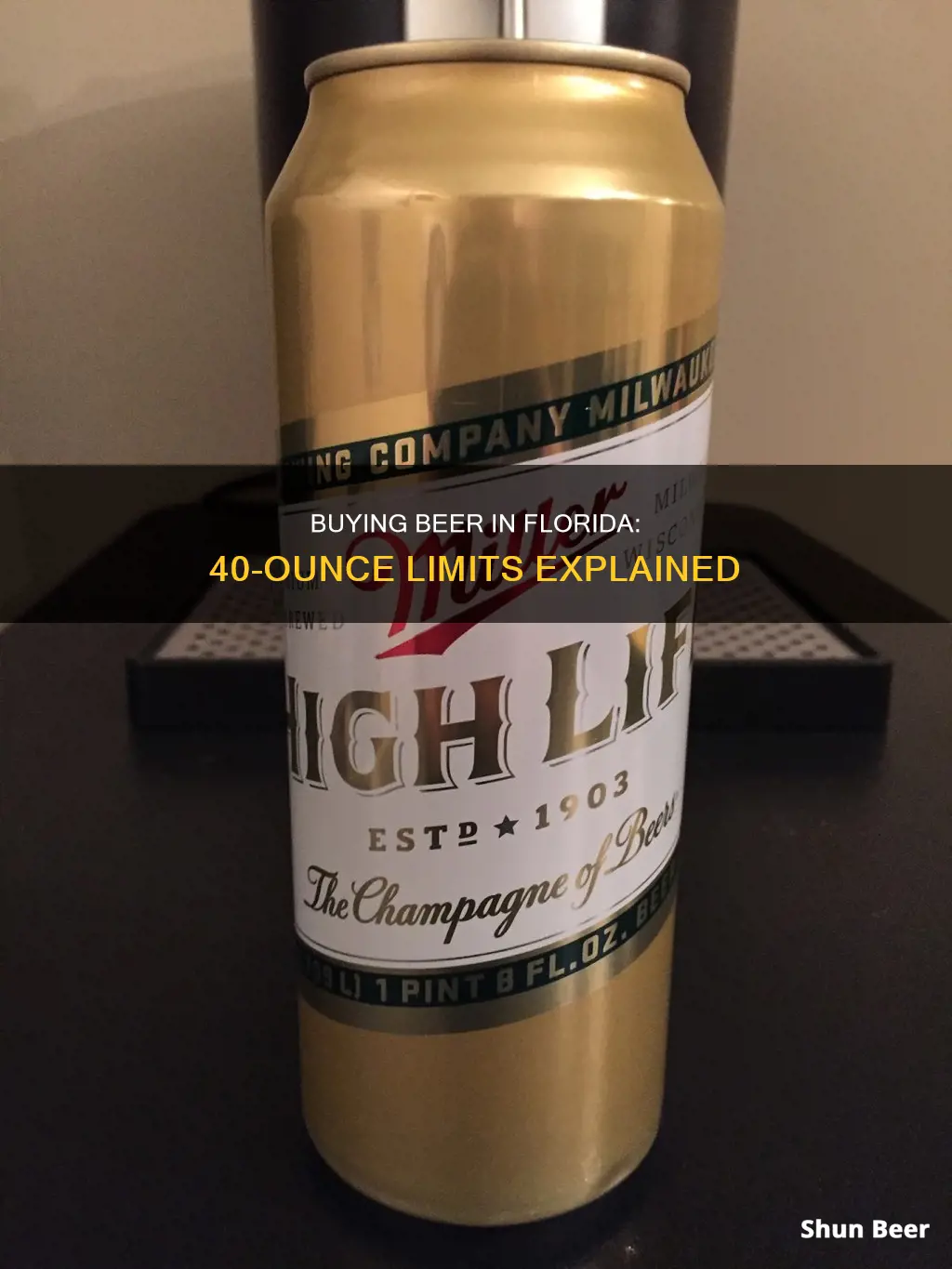
Florida has had a strange law dating back to Prohibition that restricts the sale of beer and malt liquor to containers that are either smaller than 32 ounces or larger than 128 ounces. This means that 40-ounce beers are not sold in Florida, and the maximum available size is 32 ounces. This law was enacted in 1965, and while there have been attempts to repeal it, it remains in place due to arguments from wholesale distributors that changing it would increase beer prices and require more warehouse space and larger trucks.
| Characteristics | Values |
|---|---|
| Can you buy 40-ounce beer in Florida? | No |
| When was the law restricting beer container sizes enacted? | 1965 |
| What are the allowed container sizes? | Less than 32 ounces or more than 128 ounces |
What You'll Learn

Florida's 40-ounce beer ban
Florida has a ban on the sale of beer in containers between the sizes of 32 ounces and one gallon (128 ounces). This means that 40-ounce beers are illegal in the state. The law, which has been in effect since 1965, was amended in 2001 to include this ban.
The statute, Fla. Stat. § 563.06(6), states that:
> All malt beverages packaged in individual containers sold or offered for sale by vendors at retail in this state shall be in individual containers containing no more than 32 ounces of such malt beverages; provided, however, that nothing contained in this section shall affect malt beverages packaged in bulk or in kegs or in barrels or in any individual container containing 1 gallon or more of such malt beverage regardless of individual container type.
The law was reportedly enacted at the request of Anheuser-Busch to gain an advantage over its rival, Miller. However, this has not been confirmed. The statute also offers no official justification for the ban. Still, it is believed that it was pushed through by a congressman with ties to beer corporation lobbyists.
The ban has been criticised by craft beer enthusiasts, as the industry-standard growler size of 64 ounces is prohibited. As a result, consumers must purchase two 32-ounce growlers instead of a single 64-ounce container.
Alabama's Sunday Beer Buying Laws Explained
You may want to see also

The 64-ounce beer growler exception
Florida has had a long history of restrictive laws on beer container sizes. A law restricting beer container sizes has been in effect in the state since 1965. The law was amended in 2001, which deleted the acceptable bottle sizes and replaced them with a ban on bottle sizes between 32 ounces and one gallon. This meant that beer could only be sold in containers smaller than 32 ounces or larger than 128 ounces.
The industry-standard 64-ounce growler was an exception to this rule. In 2015, Florida legalized the sale of 64-ounce growlers, bringing the state in line with 47 other states that allowed this size. The legalization of 64-ounce growlers was the result of a years-long legislative fight by craft brewers.
The 64-ounce growler exception is significant because it symbolizes a win for small local craft breweries in Florida. It also provides added revenues for these breweries and gives consumers another option for consuming beer at home. Additionally, growlers are resealable containers that reduce waste and lower packaging costs, benefiting both brewers and beer lovers.
Despite the legalization of 64-ounce growlers, Florida still has strict regulations surrounding beer sales. For example, breweries are limited in how much beer they can share with other breweries without using a distributor, and they are banned from delivering beer outside of their taprooms.
Kentucky Election Day: Beer Buying Rules Explained
You may want to see also

Distributors' opposition to growlers
In Florida, beer must be sold in containers that are either smaller than 32 ounces or larger than 128 ounces. This means that the industry-standard 64-ounce growler is unavailable, much to the frustration of craft beer enthusiasts. While it is possible to purchase two 32-ounce growlers, this is not the typical size and can be inconvenient.
The opposition to 64-ounce growlers in Florida has been influenced by the lobbying efforts of beer distributors, particularly those associated with major beer companies such as Anheuser-Busch InBev. Distributors have argued that allowing the sale of 64-ounce growlers would increase beer prices and require more warehouse space and larger trucks to accommodate the different container sizes. These arguments have successfully defeated previous attempts to repeal the restriction on container sizes.
However, the opposition to 64-ounce growlers is not universal among distributors. Notably, distributors for MillerCoors, a competitor of Anheuser-Busch, have supported legalizing half-gallon growlers. This discrepancy in positions highlights the complex dynamics within the beer distribution industry and the influence of lobbying efforts on legislation.
The debate surrounding growlers in Florida also extends beyond container sizes. Distributors have been accused of using the growler bill as a bargaining chip to pass laws that favor them, such as restrictions on the number of retail licenses per brewer and limitations on tasting rooms at breweries. These additional restrictions have been criticized as arbitrary and detrimental to the craft brewing industry.
While the availability of 64-ounce growlers in Florida remains a contentious issue, it is important to note that the situation is evolving. With consumer demand for craft beer continuing to grow, the dynamics between distributors, brewers, and legislators are likely to shift, potentially leading to changes in the law.
Minors and Non-Alcoholic Beer: Australia's Legal Perspective
You may want to see also

The 2001 bottle size amendment
The original statute was enacted in 1965 and has been the subject of much debate over the years. Some have argued that the restriction on bottle sizes was intended to benefit Anheuser-Busch by helping them edge out their rival, Miller. However, this has never been confirmed. The statute uses the term "malt beverages" to refer to both malt liquor and beer.
The wholesale distributors have successfully defeated previous attempts to repeal the bottle size restriction, arguing that such a change would increase beer prices due to the need for more warehouse space and larger trucks to handle the varied cans and bottles. On the other hand, consumers and craft beer enthusiasts have expressed frustration over the limited options, especially regarding the industry-standard 64-ounce growler size.
In recent years, there have been some changes to Florida's liquor laws, including the legalization of larger wine bottles. As of July 1, 2024, a new law went into effect, allowing the sale of wine bottles up to 15 liters. This section of the Florida statute previously placed a size limit on wine, sparkling wine, or champagne bottles, restricting them to one gallon unless in reusable 5.16-gallon containers. The amendment to this law was also supported by Governor Ron DeSantis, who called the previous restriction "anachronistic."
While Florida's laws regarding bottle sizes for wine have evolved to allow larger formats, the restrictions on beer bottle sizes remain in place. The 2001 amendment to the original 1965 statute solidified the ban on 40-ounce bottles, and it continues to be a unique feature of Florida's liquor laws.
Minors and Non-Alcoholic Beer in Oregon: What's Allowed?
You may want to see also

The industry-standard 64-ounce growler
In Florida, beer must be sold in containers either smaller than 32 ounces or larger than 128 ounces. This means that the industry-standard 64-ounce growler is unavailable for purchase in the state. This law has been in place since 1965 and has been the subject of multiple unsuccessful attempts to repeal it.
A growler is a reusable vessel that allows beer fans to enjoy fresh, local craft beer to go. The 64-ounce growler is the standard size for filling up at a brewery, and it's also great for sharing any adult beverage, from cocktails to wine to homemade cold brew. The 64-ounce size is also compatible with the DrinkTanks® Dispensing Line, allowing you to turn it into a mini travel keg.
There are a variety of 64-ounce growlers available for purchase online, made from materials such as glass or stainless steel. These growlers often feature airtight, leakproof closures to keep carbonation in and spoilage out, as well as insulation to maintain temperature. Some even come with a carry handle and laser-etched internal ounce markings for easy cocktail mixing.
While Florida's law may be inconvenient for those who prefer the standard 64-ounce growler, it's important to note that the law does allow for the sale of 32-ounce growlers, so consumers can always opt for two smaller containers instead.
Buying Beer with Food Stamps: What's Allowed?
You may want to see also
Frequently asked questions
No, you cannot buy 40-ounce beer in Florida. The maximum available size is 32 ounces.
The law restricting sizes has been in effect since 1965. It is said that the statute was pushed by a congressman friendly to beer corporation lobbyists.
Yes, Florida Representative Katie Edwards has pushed for a law that would end the ban on malt-beverage containers larger than 32 ounces but smaller than 1 gallon.
Yes, you can buy beer in Florida, but only in containers smaller than 32 ounces or larger than 128 ounces.







